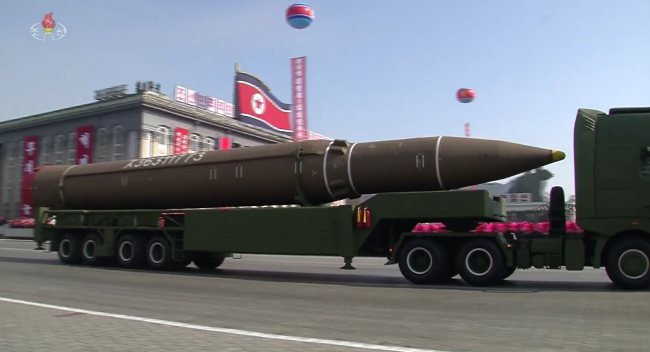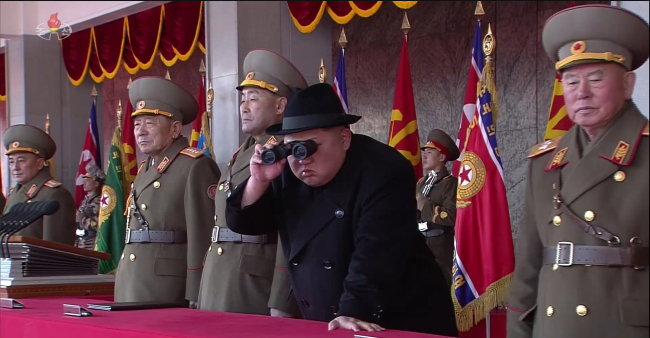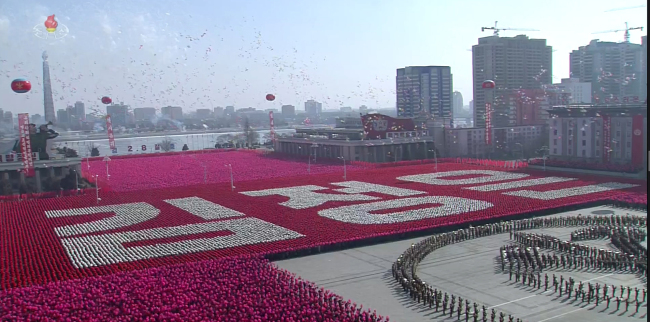A day before the opening ceremony of the PyeongChang Winter Olympics, North Korea held a military parade in Pyongyang on Thursday, with intercontinental ballistic missiles displayed in the presence of North Korean leader Kim Jong-un.
ICBM-class Hwasong-14 and -15 missiles – which were successfully test-fired last year – were shown alongside Hwasong-12 intermediate-range ballistic missiles and Pukkuksong-2, solid-fuel medium-range ballistic missiles, according to footage of the parade, which the South Korean military said it believed started at 11:30 a.m.
Some 13,000 soldiers are thought to have participated in the military event at Kim Il-sung Square in central Pyongyang. Troops marched in formation while Kim Jong-un watched from a balcony alongside his wife Ri-Sol-ju, who made a rare appearance at the public event.
 |
| Hwasong-14 appears during North Korea`s military parade in Pyongyang. Yonhap |
“Invasive forces cannot infringe upon or harass the republic’s sacred dignity and autonomy even by 0.001 millimeters,” said Kim, describing the parade as an opportunity to show North Korea’s emergence as the “world’s military power.”
Dressed in a long black winter coat that appeared to remind the audience of the North’s founding father Kim Il-sung, Kim arrived by limousine and stepped out onto a red carpet. Kim arrived at last year’s military parade in the same fashion but without his wife Ri by his side.
Also present at the event were Kim Jong-gak, a vice chief of the Ministry of the People’s Armed Forces, who was rumored to have been purged in 2012. South Korea’s National Intelligence Service believed Kim was appointed the new chief of the military’s General Political Bureau.
A South Korean military official said that the military parade took place on a scale smaller than the largest-ever military parade held last year, which showcased ICBMs and the submarine-based ballistic missile Pukguksong-1 for the first time.
“Compared to last year’s military parade, the scope and content of the event seems to have shrunk,” said the official, requesting anonymity due to the sensitivity of the matter. “It was also shorter than the event last year.”
North Korea’s state media had remained mum on the military event until it broadcast recorded image of the event on Thursday afternoon. International media were not allowed to cover the parade, while only a handful of diplomats were invited to the event.
South Korea’s Joint Chiefs of Staff had speculated the military parade would take place in a “similar pattern” to last April’s parade.
It was the first military parade since North Korean leader Kim Jong-un declared in December that his country had become a “strategic” nuclear power that could pose a direct threat to the US with its nuclear ballistic missiles.
 |
| North Korean leader Kim Jong-un uses binoculars to look out at the military parade Thursday. (Yonhap) |
Coinciding with the PyeongChang Olympics where the two Koreas are to march under the Korean Unification Flag, the military parade put South Korea in an awkward positon — pursuing efforts to improve cross-border ties despite persistent concerns over the North’s nuclear threat.
The Moon Jae-in administration reiterated that the military parade is an event for a domestic audience independent of the Olympics, but concerns are emerging over whether it would clash with Pyongyang’s pledge not to engage in hostile activities during the sporting event.
Unification Minister Cho Myung-gyun said it was “inappropriate” to link the military parade to the PyeongChang Olympics, downplaying suspicions that North Korea intentionally decided to hold a military parade a day before its athletes march into the Olympic opening ceremony on Friday.
 |
| The crowd at the military parde in Pyongyang on Thursday spell out N. Korean leader Kim Jong-un’s name in Kim Il-sung Square. (Yonhap) |
By Jun-suk Yeo
(Korea Herald)



